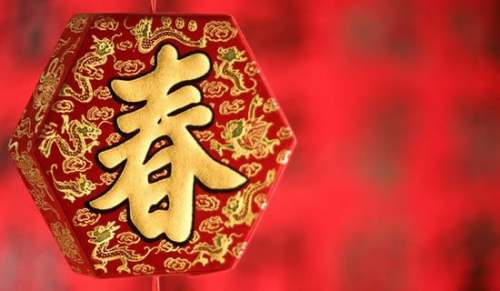- 相关推荐
中国春节习俗英语
范文一

Chinese Spring Festival celebrating the end of winter and the warmth of spring. It began in the last day of the lunar year, end in the 15th day of lunar New Year, also is the Lantern Festival. During the Spring Festival, people use red lantern and Spring Festival couplets decorate a house, put on all kinds of colored clothes, often visit friends and relatives or together eat dumplings, fish, meat and other delicious food. The children are looking forward to receiving red envelope money, and together they play each other the fireworks, with happy. Street with dragon and lion dance and some other carnival activities, CCTV will held the grand Spring Festival gala.
带翻译:
中国的春节庆祝冬天的结束和温暖春天的来临。它开始于农历年的最后一天,结束于农历正月十五,也就是元宵节。在春节期间,人们用红灯笼和春联装饰房子,穿上各式各样的彩色衣服,经常拜访亲戚朋友或聚在一起吃饺子、鱼、肉和其他美味的食物。孩子们盼望着收到红包的压岁钱,他们一起放烟花,相互玩的跟开心。大街上有舞龙、舞狮和其他一些狂欢活动,中央电视台会举行盛大的春节联欢晚会。
范文二
China nation has a strong family concept and always have family reunion in some important days. Family Reunion Dinner is an essential custom on New Year's Eve. They usually enjoy a big feast this day. And dumpling and fish are must during the Family Reunion Dinner on New Year's Eve. Some people will put a coin inside one dumpling. The people who eat this dumpling will be to thought be a lucky guy. The fish could not be eaten out because the fish means extra things by partial tone. And it represents the wish for a prosperous year with abundant and even extra wealth and luck.
带翻译:
中国国家有很强的家庭观念,在一些重要的日子总是有家庭聚会。年夜饭是一个重要的习俗在新年前夕。他们通常喜欢一个大宴会。饺子和鱼必须在除夕的年夜饭。有些人会将一枚硬币放在一个饺子。吃这饺子的人会认为是一个幸运的人。鱼不能吃,因为谐音的鱼意味着额外的东西。,它代表着希望与丰富繁荣的一年,甚至额外的财富和运气。
范文三
The spring Festival is coming soon! The festivel is considereded the most important one for Chinese people. It is on the first day of lunar year. It is also the day of reunion among family members. During these days, people would say "happy new year! or wish you make fortune! to each other. They would also visit their relatives and friends. Children would be given "red packets". Children would have more to eat and play than usual.Playing firecrackers is also a popular game for children.
带翻译:
春节快到了,这个节日被认为是中国人民最重要的一个。它是在农历年的第一天。也是家人团聚的日子。在这些日子里,人们会说“新年快乐!还是祝你好运!彼此。他们也会拜访他们的亲戚和朋友。孩子们将获得“红色packets"。孩子会比平时更多的吃和玩。儿童玩鞭炮也是一个受欢迎的游戏。
范文四:
The Spring Festival is the most important festival in China.People usually decorate the doors and windows with red papercuts.becouse red means good luck.People usually clean house too.becouse they want to sweep away bad luck.Children can get some new clothes or presents from their parents and grandparents.On New Year's Eve,family always have a big dinner.Everybody are watch TV and talk.In the midnight,there usually fairworks.On New Year's Day,people usually put on their new clothes and visit their femily and friends.They usually say Happy New Year's Day. The Spring Festival finishes at the Lantern Festival after two weeks.People usually eat a kind of rice dumpling called yuanxiao.It can take people good luck all the year round.
带翻译:
春节是中国最重要的节日。人们通常用红色的剪纸装饰门和窗户。因为红色意味着好运。人们通常打扫房子。因为他们想要扫除坏运气。孩子们可以买些新衣服或礼物来自父母和祖父母。在新年前夕,家人总是有一大堆的晚餐。每个人都是看电视和聊天。在午夜,人们通常fairworks。在元旦,人们通常穿上他们的新衣服和访问他们femily和朋友。他们通常说新年快乐。春节结束在两周后的元宵节。人们通常吃一种叫元宵的粽子。它可以把人们一年四季好运。
范文五
The Spring Festival is the most important festival for the Chinese people and is when all family members get together, just like Christmas in the West. All people living away from home go back, becoming the busiest time for transportation systems of about half a month from the Spring Festival. Airports, railway stations and long-distance bus stations are crowded with home returnees.
During Spring Festival, the most improtant days are Spring Festival Eve and the first three days.Many customs accompany the Spring Festival.
During Spring Festival time, you can see kinds of decorations.you can go to temple fairs and enjoy superb performances of the dances, stilt-walking and amazing acrobatic shows.so i like it .
带翻译:
春节是中国人民最重要的节日,所有的家庭成员聚在一起,就像西方的圣诞节。住远离家的所有人回去,成为最繁忙时间交通系统从春节约半个月。机场、火车站和长途汽车站挤满了回家的海归。
春节期间,最重要的一天是春节前夕,前三天。春节有许多习俗。
在春节期间,你可以看到各种装饰。你可以去庙会,享受一流的表演的舞蹈,和惊人的杂技节目。所以我喜欢它。
范文六
Its origin is ancient, but many believe the word Nian, which means year , was the name of a beast that preyed on people on the eve of a new year.In one legend, the beast, Nian, had the power to swallow up all the people in a village in one big bite. Village people were very scared of Nian.One day, an old man came to the villagers' rescue, offering to subdue Nian. The old man asked Nian,I know you can swallow people, but can you swallow other beasts of prey instead of people who are by no means your worthy opponents? Nian accepted the old man's challenge and swallowed the beasts that had harassed the villagers and their farm animals for years.At the end of the legend, the old man disappeared riding off on Nian. In this legend, the old man turned out to be an immortal god.In the end, Nian is gone and the other beasts of prey are scared into hiding in the forests. The villagers can once again enjoy their peaceful life.The legend goes on to say before the old man left, he told the villagers to put red paper decorations on their windows and doors at each year's end in order to keep Nian away. It is believed Nian is afraid of the color red.The tradition of observing the conquest of Nian is carried on from generation to generation. The term Guo Nian , which means Survive the Nian became Celebrate the Year and the word guo in Chinese means both pass over and observe .The custom of putting up red paper and lighting firecrackers to scare away Nian continues today.
带翻译:
它的起源是古老的,但许多人认为“年”这个词,也就是说,人的名字是一个野兽,新年前夕。年,在一个传说,野兽吞噬的力量在一个村子里所有的人在一个大的咬人。村人非常害怕“年”。有一天,一位老人来到了村民的救援,提供制服“年”。老人年问,我知道你可以吞下人们,而是你能接受其他掠食野兽的人绝不是你的对手吗?年接受了老人的挑战和吞下的野兽骚扰村民和他们的农场动物。的传说,老人骑在年消失了。在这个传说,老人原来是一个不朽的神。最后,年走了,其他掠食野兽害怕到躲在森林里。村民们可以再次享受平静的生活。传说说老人离开之前,他告诉村民们把红色的纸来装饰门窗在每个年底为了赶走“年”。人们认为“年”最怕的颜色是红色。观察年的征服的传统代代相传。过年这个词,这就意味着生存年成为庆祝,郭在中国这个词意味着过去和观察。贴红纸,放鞭炮来驱赶一直延续到今天。
[中国春节习俗英语]
【中国春节习俗英语】相关文章:
中国节日 -春节习俗09-19
浅谈中国传统春节的习俗文化09-11
用英语介绍春节习俗03-12
春节的习俗英语翻译07-30
浅谈中国传统春节的习俗文化(2)10-10
中国婚礼文化及习俗09-08
描写春节习俗的英语作文及翻译08-20
中国各地传统中秋习俗07-27
中国人不得不知道的春节习俗08-04
春节习俗03-08